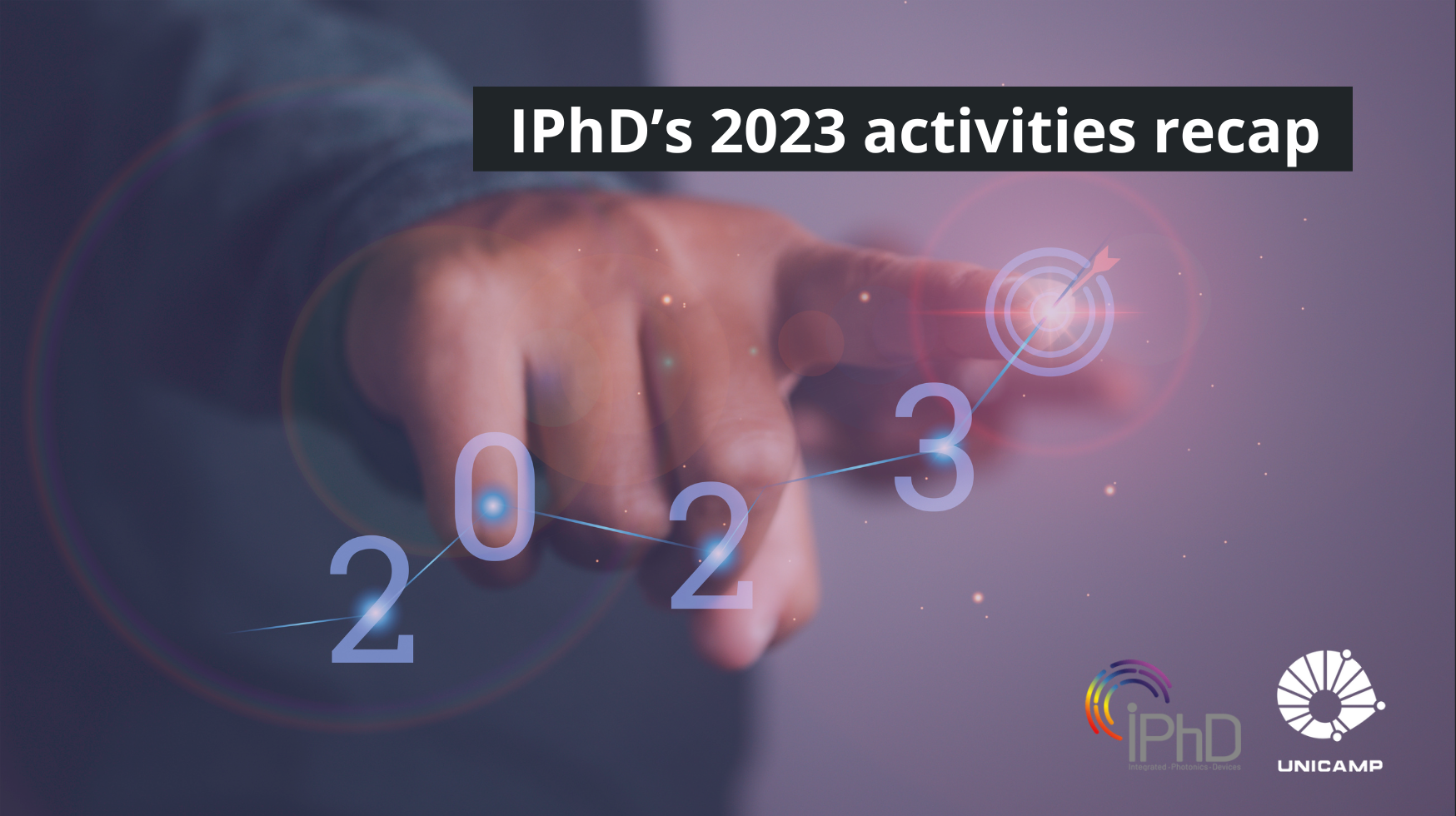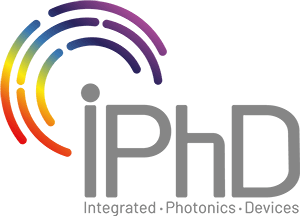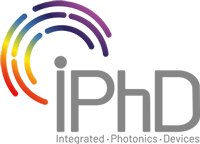January 31, 2024 Beyond the Lab: IPhD’s Brilliant Year in Research and Entrepreneurship
2023 was a year of scientific achievements and innovation for IPhD. Discover more now!

Text by Greta Garcia
Marked by impactful scientific article publications, participation in important events and integrated project management, 2023 was a year full of achievements and accomplishments for the IPhD team. The academic recognition was notable: in addition to scientific advances, research contributions were disseminated through articles published in renowned journals such as Nature Communications, Optics, and JOSA B. Also, the participation in international conferences, such as SBFOTON/OMN, IEEE Photonics Conference, CLEO 2023, and PIERS 2023, highlights the relevance of the scientific community regarding these studies.
IPhD’s commitment to promote entrepreneurship and technology transfer remained active in the past year, along with efforts to share scientific advances and work at university events, on the official website, and on social media.
The integrative character also prevailed: the collaboration with the Integrated Photonics Laboratory (LIF) was crucial for the success of the 2nd Workshop on Photonic Industry and Entrepreneurship, held between October 30 and 31. The event brought together leaders and experts in the photonics industry with the support of the SISFOTON Program and the IEEE Photonics Society. Additionally, three new researchers joined the project: Prof. Nathalia Tomazio, Prof. Diogo Almeida, and Prof. Luis Barea.
Scientific Advances in New Materials, Nonlinear Photonics, and Hybrid Integration throughout the Year
In the scientific research scope, 2023 revealed notable advances in the three main research lines of IPhD: New Materials (NMAT), Nonlinear Photonics (NLP), and Hybrid Integration (HINT). Each of these areas made significant contributions to the scientific community and to the development of innovative technologies over the past year.
New Materials (NMAT): Exploring Frontiers in Nonlinear Optics
In the New Materials field, the investigations focused on CsPbBr3 perovskite nanocrystals. The goal was to achieve a high nonlinear optical response by constructing perovskite superstructures in colloidal suspensions. Contrary to literature expectations, the results did not show evidence of improvement in the nonlinear response of these nanomaterials. Furthermore, the origins of delayed emission in PNCs and other nanomaterials were also investigated.
A guest paper presentation at CLEO 2023 highlighted the characterization of nonlinear optical properties of 2D materials. In collaboration with the Nonlinear Photonics (NLP) team, the article also addressed the incorporation of these 2D materials into integrated waveguides for harmonic generation.
A review article on nonlinear optics in 2D materials, focusing on work in Latin America, was published. As representatives from South America, the work was presented in a special edition of JOSA B.
Nonlinear Photonics (NLP): Innovations in Light Manipulation
In the field of Nonlinear Photonics, the highlight was the successful demonstration of an optomechanical system with enhanced dissipative coupling, published in Nature Communications.
Additionally, the confirmation of stimulated Brillouin-Mandelstam scattering in an integrated Lithium Niobate waveguide, expanding possibilities for light manipulation in photonic devices, was accepted for publication in Optics.
Hybrid Integration (HINT): Advancing Material Fusion for Integrated Chips
In the area of Hybrid Integration, significant progress was made in integrating 2D materials, especially MoTe2/MoS2, into integrated photonics chips. Ongoing investigations into promising saturable absorption properties open new perspectives for the development of integrated devices. Advances in MoTe2 research were published as proceedings and presented at two conferences.
Another major highlight was the completion of the work related to integrated lasers with silicon photonic mirrors, resulting in two publications in JOSA B, an article presentation at PIERS 2023 in Prague, and the completion of a doctoral thesis.
Events hosted in 2023 have an impact on the scientific and entrepreneurial community
The 2nd Workshop on Photonic Industry and Entrepreneurship, organized in partnership with LIF – UNICAMP, the IEEE Photonics Society, and with the support of the Ministry of Science, Technology, and Innovation, brought together national and international leaders to discuss trends, strategies, and the transformation of research into successful ventures. Software simulations, the promotion of disruptive technologies, and the encouragement of student entrepreneurship were highlights.
The Workshop introduced initiatives such as Demo Day, where innovative startups like Alfa Sense gained visibility and recognition. Another initiative was the LIF Empreende program, aiming to commercialize laboratory technologies and cultivate entrepreneurial skills among students and academics. This event not only strengthened the academia-industry collaboration but also laid the groundwork for technological advancements and economic growth, reflecting a joint commitment to driving innovation and improving society’s quality of life.
A special invitation: Prof. Frateschi at the IEEE Photonics Society Annual Meeting
In recognition of the efforts to promote technological advancement and entrepreneurship, Prof. Newton Frateschi was invited to speak at the Annual Meeting of the IEEE Photonics Society. In his presentation, he addressed the Photonics landscape in Brazil and shared best practices for fostering entrepreneurship within academia.
Outlook for the Future
The advances achieved in 2023 provide a solid foundation for future research and practical applications. The ongoing integration of different areas promises to drive even more significant innovations; The collaboration between teams and the pursuit of a deeper understanding of studied phenomena ensure that scientific research continues to play a vital role in advancing technology and expanding human knowledge.
Expectations for the project’s continuation revolve around these prospects, and the IPhD team promises to remain steadfast in its joint mission to contribute to the scientific and entrepreneurial community through innovation and a commitment to science, its dissemination, and its return to society.



